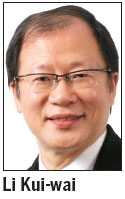
How should Hong Kong's economy and authority cope with the increasing parallel trade, especially in baby formula? The Hong Kong government has reacted by imposing a ceiling on the amount of baby formula being brought across the border. This has raised concerns and criticisms, as it may lead to conflicts (and has in some cases already) with mainland residents.
First, it is beyond Hong Kong's control if mainland consumers distrust their own products. Suppliers of baby formula should have made good business, and free-market believers would think that suppliers of baby formula would seize the opportunity and make a good business. Hong Kong people can seize the opportunity to open more shops nearer the border, or shops in the other side of the border, declaring that their baby formula are imported from Hong Kong. Why the suppliers and the business sector fail to seize these opportunities?
Second, some have criticized the government saying the imposition of restrictions on parallel trade in baby formula is a violation of the World Trade Organization (WTO) conditions as it effectively amounted to trade protectionism and Hong Kong SAR is a member of the WTO. But no, this is not a case of trade protectionism. The WTO does not cover parallel trade or personal carriage across border immigration. This is just a law executed by immigration. Such examples can easily be found in other countries: some countries restrict travelers from Hong Kong bringing dry mushrooms at immigration. Immigration restrictions can be imposed for various reasons. Protectionism or violation of free trade will be the case if there is "formal" restriction of export or import of baby formula.
Related readings:
Baby food recalled in mercury alert
Pregnancy diet affects baby: research

 'Taken 2' grabs movie box office crown
'Taken 2' grabs movie box office crown
 Rihanna's 'Diamonds' tops UK pop chart
Rihanna's 'Diamonds' tops UK pop chart
 Fans get look at vintage Rolling Stones
Fans get look at vintage Rolling Stones
 Celebrities attend Power of Women event
Celebrities attend Power of Women event
 Ang Lee breaks 'every rule' to make unlikely new Life of Pi film
Ang Lee breaks 'every rule' to make unlikely new Life of Pi film
 Rihanna almost thrown out of nightclub
Rihanna almost thrown out of nightclub
 'Dark Knight' wins weekend box office
'Dark Knight' wins weekend box office
 'Total Recall' stars gather in Beverly Hills
'Total Recall' stars gather in Beverly Hills















